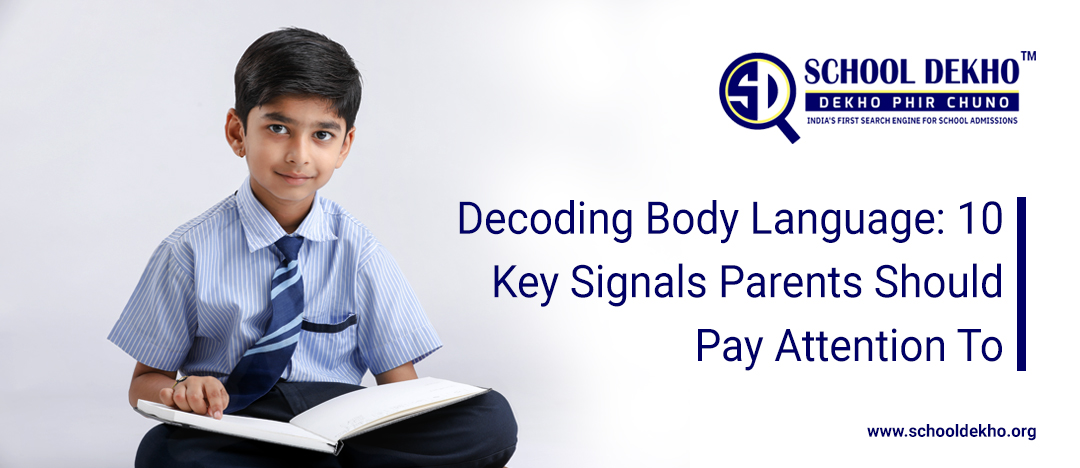
Decoding Body Language: 10 Key Signals Parents Should Pay Attention To
Parenting is a dynamic and ever-evolving journey that involves not only verbal communication but also the interpretation of nonverbal cues. Understanding and responding to your child's body language can significantly enhance your ability to connect with them and meet their emotional and physical needs. Here are ten important body language signals that parents should pay attention to:
- Facial Expressions: The face is a window into your child's emotions. Pay attention to facial expressions, as they can convey joy, sadness, anger, or discomfort. Notice changes in eyebrow position, eye contact, smiles, or frowns, which provide valuable insights into their emotional state.
- Eye Contact: Eye contact is a powerful form of nonverbal communication. While direct eye contact may indicate interest and engagement, avoiding eye contact might signify shyness, discomfort, or a need for space. Be attentive to your child's eye contact patterns to better understand their emotions and level of comfort.
- Posture and Body Tension: Posture and body tension provide clues about your child's emotional state. Observe if they are standing tall, slouching, or exhibiting tense body language. A relaxed and open posture suggests comfort and confidence, while hunched shoulders or crossed arms may indicate defensiveness or unease.
- Gestures: Watch for gestures such as pointing, reaching, or pulling away, as they can reveal your child's desires or boundaries. Paying attention to their gestures can help you understand what they want or need, allowing you to respond appropriately.
- Touch: The power of touch in parent-child relationships is immense. Observe your child's response to touch, whether they seek it, withdraw from it, or show discomfort. Respect their boundaries and provide nurturing touch when they express a desire for it.
- Fidgeting and Restlessness: Restlessness and fidgeting often indicate unease, boredom, or the need for physical activity. If you notice your child becoming fidgety or restless, it may be a sign that they require a change of environment or engagement in a stimulating activity.
- The tone of Voice: Beyond the words they speak, listen to your child's tone of voice. Variations in pitch, volume, or speed can reveal their emotions. A soft and gentle tone may indicate calmness, while a loud or harsh tone might suggest frustration or anger.
- Proximity and Personal Space: Pay attention to your child's need for personal space and their response to proximity. Some children thrive on physical closeness, while others prefer more personal space. Respect their boundaries and adapt your interactions accordingly.
- Energy Level: Observe changes in your child's energy level. Are they full of energy and enthusiasm or appearing fatigued and sluggish? Their energy level can provide insights into their overall well-being, physical needs, or emotions.
- Nonverbal Cues During Play: Play is a powerful platform for children to express themselves. Observe their nonverbal cues during playtime. Notice if they are engaged, enthusiastic, or disinterested. Understanding their nonverbal cues during play can give you a glimpse into their emotional world and interests.
Paying attention to these body language signals allows you to deepen your connection with your child, respond effectively to their needs, and create a nurturing and supportive environment. Here are a few essential tips to enhance your understanding of their body language:
- Be Present and Attentive: Practice being fully present when interacting with your child. Give them your undivided attention, allowing you to observe and interpret their body language accurately.
- Cultivate Empathy: Put yourself in your child's shoes and try to understand their perspective. Empathy allows you to tune in to their emotions and decode their body language more effectively.
- Validate and Respond: When you notice your child's body language cues, validate their emotions and respond accordingly. Let them know that you understand and acknowledge their feelings, which fosters a sense of trust and emotional connection.
- Practice Open Communication: Encourage open communication with your child. Create a safe space where they feel comfortable expressing their emotions verbally as well as through body language. This helps build a strong foundation for healthy emotional expression.
- Learn Their Unique Signals: Each child has their own unique set of body language signals. Take the time to observe and learn your child's specific cues. This understanding will deepen your bond and enable you to respond to their needs more effectively.
- Stay Calm and Patient: It's important to remain calm and patient when interpreting your child's body language. Rushing to conclusions or reacting impulsively may hinder effective communication. Take a deep breath, observe, and respond with patience and understanding.
- Seek Professional Help if Needed: If you consistently struggle to interpret or respond to your child's body language cues, consider seeking guidance from a pediatrician, child psychologist, or parenting counselor. They can provide valuable insights and strategies to navigate any challenges.
Remember, body language is just one aspect of communication, and it should be considered alongside verbal cues and context. By developing a keen awareness of your child's body language, you can foster a deeper connection, promote emotional well-being, and meet their needs more effectively.
In conclusion, paying attention to your child's body language is a powerful tool for understanding their emotions, needs, and desires. By observing their facial expressions, eye contact, posture, gestures, and tone of voice, you can gain valuable insights into their emotional world. Cultivating empathy, open communication, and patience allows you to respond appropriately, strengthening your bond and fostering a nurturing parent-child relationship. By actively decoding their body language, you can create a supportive environment where your child feels seen, understood, and valued.
Contact with Us
Call: 1800 - 2588 - 074
Mail: info@schooldekho.org
Student’s Best Education Portal | School Dekho | India's First School Search Engine | Best Schools Near Me | Find Schools Near Me | Dekho Phir Chuno
#dekhophirchuno







Leave your thought here
Your email address will not be published. Required fields are marked *